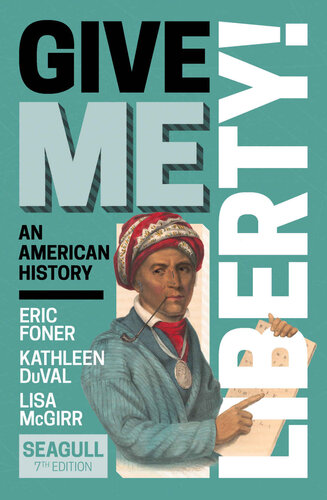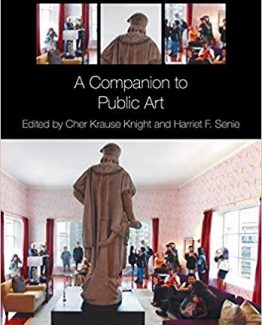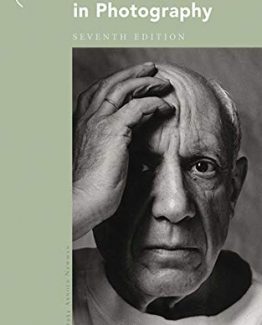Give Me Liberty! Seagull 7th Edition (Combined Volume) by Eric Foner, ISBN-13: 978-1324041207
[PDF eBook eTextbook]
- Publisher: W. W. Norton & Company; Seagull Seventh edition (December 15, 2022)
- Language: English
- ISBN-10: 132404120X
- ISBN-13: 978-1324041207
The Seagull Edition offers the complete text of the Full Edition in full color and a portable trim size with fewer illustrations and maps and an exceptionally low price.
The #1 U.S. history text with inclusive new coverage and improved support for student readers.
Give Me Liberty! is beloved by instructors and students alike because it delivers an authoritative, concise, and integrated American history. In the Seventh Edition, Eric Foner welcomes acclaimed scholars Kathleen DuVal and Lisa McGirr as co-authors. Together, they have enhanced coverage of Native American history with an emphasis on how it refines our understanding of freedom―the book’s urgent guiding theme. New pedagogical tools, including a guided interactive reading experience with support in developing critical thinking skills, are designed to help students get the most out of this beloved text.
Table of Contents:
Cover
Half-title Page
Physical/Political Map of The United States
Political Map of The World
Title Page
Copyright
Dedication
Contents
List of Maps, Tables, and Figures
About the Authors
Preface
Resources For Students And Instructors
Chapter 1: Old Worlds and New
An Old World: North America
An Old World: West Africa
An Old World: Western Europe
Contact
The Spanish Empire
The French and Dutch Empires
Chapter Review
Chapter 2: European Colonies and Native Nations, 1600–1660
England and the Americas
Early English Exploration and Colonization
The Chesapeake
Origins of American Slavery
The New England Way
New Englanders Divided
Religion, Politics, and Freedom
Chapter Review
Chapter 3: Creating Anglo-America, 1660–1750
Global Competition and the Expansion of England’s Empire
Entrenchment of American Slavery
Colonies in Crisis
The Growth of Colonial America
Social Classes in the British Colonies
North America at Mid-Century
Chapter Review
Chapter 4: Slavery, Freedom, and the Struggle for Empire to 1763
Slavery and Empire
Slave Cultures and Slave Resistance
An Empire of Freedom
The Public Sphere
The Great Awakening
Imperial Rivalries
Battle for the Continent
Chapter Review
Chapter 5: The American Revolution, 1763–1783
The Crisis Begins
The Road to Revolution
The Coming of Independence
Securing Independence
Chapter Review
Chapter 6: The Revolution Within
Democratizing Freedom
Toward Religious Toleration
Defining Economic Freedom
The Limits of Liberty
Slavery and the Revolution
Daughters of Liberty
Chapter Review
Chapter 7: Founding a Nation, 1783–1791
America Under the Confederation
A New Constitution
The Ratification Debate and the Origin of the Bill of Rights
“We the People”
Chapter Review
Chapter 8: Securing the Republic, 1791–1815
Politics in an Age of Passion
The Adams Presidency
Jefferson in Power
The “Second War of Independence”
Chapter Review
Chapter 9: The Market Revolution, 1800–1840
A New Economy
The Rise of the West
Market Society
The Free Individual
The Limits of Prosperity
Chapter Review
Chapter 10: Democracy in America, 1815–1840
The Triumph of Democracy
Nationalism and Its Discontents
Nation, Section, and Party
The Age of Jackson
Indian Removal
The Bank War and After
Chapter Review
Chapter 11: The Peculiar Institution
The Old South
Life Under Slavery
Slave Culture
Resistance to Slavery
Chapter Review
Chapter 12: An Age of Reform, 1820–1840
The Reform Impulse
The Crusade Against Slavery
Black and White Abolitionism
The Origins of Feminism
Chapter Review
Chapter 13: A House Divided, 1840–1861
Fruits of Manifest Destiny
A Dose of Arsenic
The Rise of the Republican Party
The Emergence of Lincoln
The Impending Crisis
Chapter Review
Chapter 14: A New Birth of Freedom: The Civil War, 1861–1865
The First Modern War
The Coming of Emancipation
The Second American Revolution
The Confederate Nation
Turning Points
Rehearsals for Reconstruction and the End of the War
Chapter Review
Chapter 15: “What Is Freedom?”: Reconstruction
The Meaning of Freedom
The Making of Radical Reconstruction
Radical Reconstruction in the South
The Overthrow of Reconstruction
Chapter Review
Chapter 16: America’s Gilded Age, 1870–1890
The Second Industrial Revolution
Freedom in the Gilded Age
Labor and the Republic
The Transformation of the West
Politics in a Gilded Age
Chapter Review
Chapter 17: Freedom’s Boundaries, at Home and Abroad, 1890–1900
The Populist Challenge
The Segregated South
Redrawing the Boundaries
Becoming a World Power
Chapter Review
Chapter 18: The Progressive Era, 1900–1916
An Urban Age and a Consumer Society
Varieties of Progressivism
The Politics of Progressivism
The Progressive Presidents
Chapter Review
Chapter 19: Safe for Democracy: The United States and World War I
An Era of Intervention
America and the Great War
The War at Home
Who Is an American?
1919
Chapter Review
Chapter 20: From Business Culture to Great Depression: The Twenties, 1920–1932
The Business of America
Business and Government
The Birth of Civil Liberties
The Culture Wars
The Great Depression
Chapter Review
Chapter 21: The New Deal, 1932–1940
The First New Deal
The Grassroots Revolt
The Second New Deal
A Reckoning With Liberty
The Limits of Change
A New Conception of America
Chapter Review
Chapter 22: Fighting for the Four Freedoms: World War II, 1941–1945
Fighting World War II
The Home Front
Visions of Postwar Freedom
The American Dilemma
The End of the War
Chapter Review
Chapter 23: The United States and the Cold War, 1945–1953
Origins of the Cold War
The Cold War and the Idea of Freedom
The Truman Presidency
The Anticommunist Crusade
Chapter Review
Chapter 24: An Affluent Society, 1953–1960
The Golden Age
The Eisenhower Era
The Freedom Movement
The Election of 1960
Chapter Review
Chapter 25: The Sixties, 1960–1968
The Civil Rights Revolution
The Kennedy Years
Lyndon Johnson’s Presidency
The Changing Black Movement
Vietnam and the New Left
The New Movements and the Rights Revolution
1968
Chapter Review
Chapter 26: The Conservative Turn, 1969–1988
President Nixon
Grassroots Rights Movements
Foreign Policy and Watergate
The End of the Golden Age
The Rising Tide of Conservatism
The Reagan Revolution
Chapter Review
Chapter 27: A New World Order, 1989–2004
The Post–Cold War World
Globalization and Its Discontents
Culture Wars
Impeachment and the Election of 2000
The Attacks of September 11
The War on Terrorism
An American Empire?
The Aftermath of September 11 at Home
Chapter Review
Chapter 28: A Divided Nation
The Winds of Change
The Great Recession
Obama in Office
The Obama Presidency
President Trump
2020: Year of Crisis
Freedom in the Twenty-First Century
Chapter Review
Suggested Reading
The Declaration of Independence (1776)
The Constitution of The United States (1787)
Glossary
Credits
Index
Eric Foner is DeWitt Clinton Professor Emeritus of History at Columbia University. In his teaching and scholarship, he focuses on the Civil War and Reconstruction, slavery, and nineteenth-century America. He has served as president of the Organization of American Historians and the American Historical Association. In 2006, he received the Presidential Award for Outstanding Teaching from Columbia University. His most recent books are The Fiery Trial: Abraham Lincoln and American Slavery, winner of the Bancroft and Lincoln Prizes and the Pulitzer Prize for History; Gateway to Freedom: The Hidden History of the Underground Railroad, winner of the New York Historical Society Book Prize; and The Second Founding: How the Civil War and Reconstruction Remade the Constitution.
Kathleen DuVal is Bowman and Gordon Gray Professor of History at the University of North Carolina at Chapel Hill, where she teaches early American history. Her research focuses on how various Native American, European, and African people interacted from the sixteenth through the early nineteenth centuries. Her most recent book, Independence Lost: Lives on the Edge of the American Revolution, won multiple awards for its rich retelling of the history of the Revolutionary Era as experienced by enslaved people, Native Americans, and women living on Florida’s Gulf coast. DuVal has also won the Guggenheim Fellowship in the Humanities, a National Humanities Center Fellowship, and a postdoctoral fellowship from the Andrew W. Mellon Foundation. She is also an Elected Fellow for the American Antiquarian Society and the Society of American Historians.
Lisa McGirr is Professor of History at Harvard University, where she specializes in the history of the twentieth-century United States. Her research and teaching interests bridge the fields of social and political history and focus on collective action, state building, reform movements, and politics. Her most recent book, The War on Alcohol: Prohibition and the Rise of the American State, won acclaim for excavating the significant but neglected state-building legacies of national Prohibition. Her award-winning first book, Suburban Warriors: The Origins of the New American Right, investigated the social and regional basis of grassroots conservative politics in the post–World War II United States. She teaches a wide variety of courses on the history of the United States in the twentieth century.
What makes us different?
• Instant Download
• Always Competitive Pricing
• 100% Privacy
• FREE Sample Available
• 24-7 LIVE Customer Support






Reviews
There are no reviews yet.